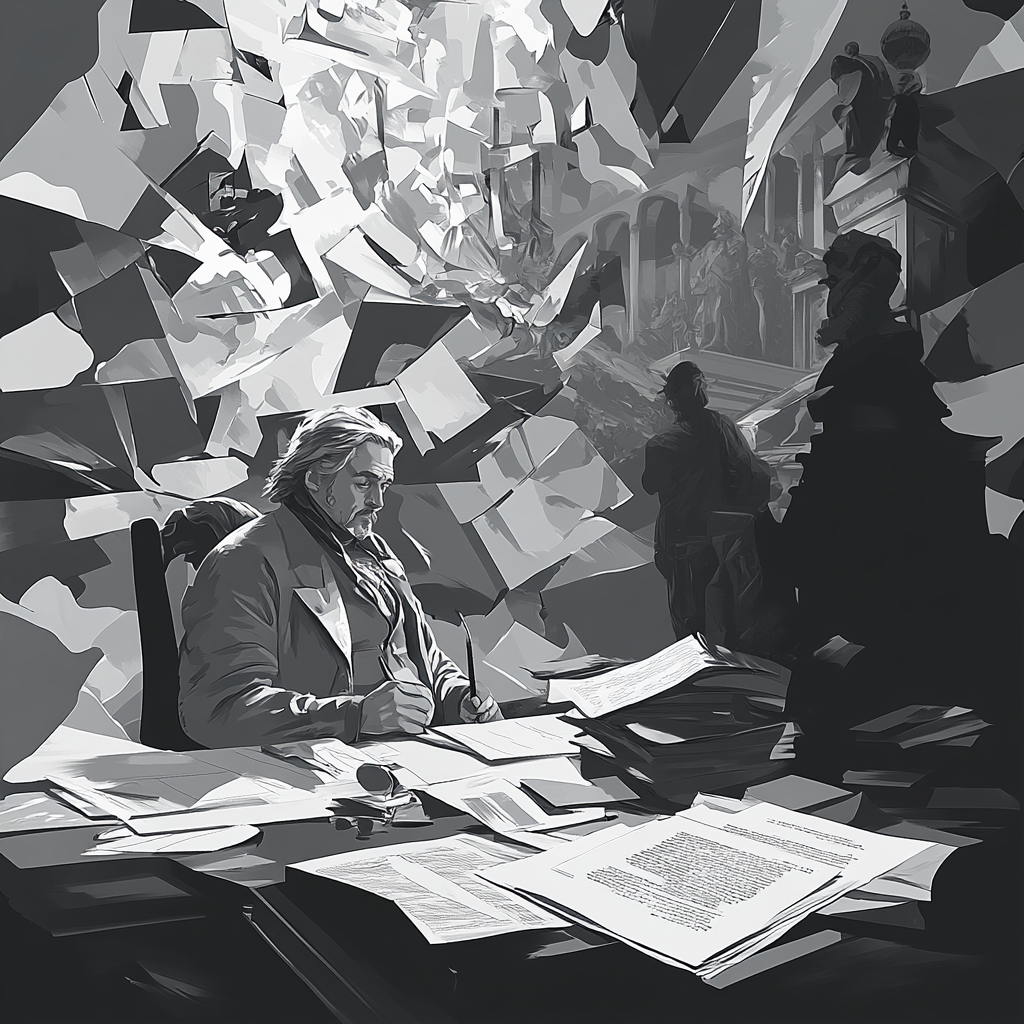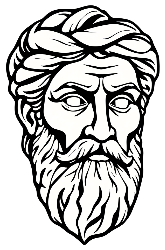Modern Western philosophy marks a significant shift from the medieval focus on theology and religious authority to a new emphasis on reason, human experience, and individual freedom. This transition began in the 17th century with René Descartes, who is often considered the “father of modern philosophy,” and extended through the work of figures like Immanuel Kant and Georg Wilhelm Friedrich Hegel. These philosophers set the stage for many of the philosophical debates and movements that define the contemporary landscape, including existentialism, phenomenology, and analytic philosophy.
In this article, we will explore the evolution of modern Western philosophy, focusing on its key figures and movements, from Descartes’ rationalism to the diverse and vibrant philosophical traditions of today.
The Beginning of Modern Philosophy: Descartes and Rationalism
Modern philosophy began with René Descartes (1596–1650), whose search for certainty in a world full of doubt led him to redefine the relationship between the mind and the external world. His famous statement, “Cogito, ergo sum” (“I think, therefore I am”), encapsulates his foundational belief that the act of thinking is proof of one’s existence.
Descartes’ Method of Doubt
Descartes began by doubting everything he could possibly doubt, including his senses and the physical world. His goal was to find a foundational truth that could withstand all doubt. The cogito—the realization that he could not doubt his own existence as a thinking being—became the bedrock of his philosophy. From this starting point, Descartes built his system of rationalism, the belief that reason is the primary source of knowledge.
- Mind-Body Dualism: Descartes introduced dualism, the idea that the mind and body are separate substances. The mind, which is non-material and capable of thought, is distinct from the body, which is material and extended in space. This separation between mind and body had profound implications for later debates about consciousness and the nature of reality.
Descartes’ focus on reason and the autonomous individual laid the groundwork for many subsequent philosophical developments, particularly in epistemology (the study of knowledge) and metaphysics (the study of the nature of reality).
Rationalism vs. Empiricism
While Descartes championed rationalism, others soon challenged this view, leading to one of the central debates in modern philosophy: the conflict between rationalism and empiricism.
- John Locke (1632–1704), an English philosopher, was one of the most important figures in the empiricist tradition. In his Essay Concerning Human Understanding (1690), Locke argued that the mind is a tabula rasa (blank slate) at birth, and all knowledge comes from experience. This directly opposed Descartes’ view that certain ideas, like those of mathematics and logic, are innate.
- David Hume (1711–1776) took empiricism even further, challenging the very notion of causality. In his An Enquiry Concerning Human Understanding (1748), Hume argued that we never directly perceive cause and effect; instead, we observe one event followed by another and form habits of expectation. Hume’s radical skepticism raised deep questions about the limits of human knowledge.
Immanuel Kant: Synthesizing Rationalism and Empiricism

Immanuel Kant (1724–1804) revolutionized philosophy by offering a synthesis of rationalism and empiricism. In his seminal work, Critique of Pure Reason (1781), Kant sought to answer the question:
How is knowledge possible? He argued that while all knowledge begins with experience (an empiricist claim), the human mind actively shapes and structures that experience using innate concepts like time, space, and causality (a rationalist claim).
Philosophy as a Guide for Public Life
Kant’s Theory of Knowledge
Kant’s critical philosophy introduced the idea that we do not passively receive knowledge from the world but rather that our minds impose certain structures on our perceptions. He distinguished between the phenomenal world (the world as we experience it) and the noumenal world (the world as it is in itself, independent of our perception). We can never fully know the noumenal world, Kant argued, but we can understand the phenomenal world through the structures our minds provide.
Kant’s Moral Philosophy
Kant’s contributions to moral philosophy are equally important. In his Groundwork of the Metaphysics of Morals (1785), Kant introduced the categorical imperative, a universal moral law based on reason. The categorical imperative commands that we act only according to maxims that can be universally applied. In other words, we should only do something if we believe everyone else should do the same in similar circumstances.
Kant’s ethical framework emphasized the importance of autonomy and the idea that moral actions must be done out of a sense of duty, rather than for personal gain or emotional reasons. His work laid the foundation for deontological ethics, which focuses on the inherent rightness or wrongness of actions.
Hegel and the Dialectic
Georg Wilhelm Friedrich Hegel (1770–1831) developed a complex system of idealism that focused on the process of dialectical reasoning. Hegel argued that reality, including human history, unfolds through a dynamic process of contradictions and their resolutions—a process he called the dialectic.
Hegel’s Dialectic
Hegel’s dialectical process involves three stages:
- Thesis: An initial idea or state of affairs.
- Antithesis: A contradiction or opposing idea that arises from the thesis.
- Synthesis: A resolution that overcomes the conflict between the thesis and antithesis, leading to a higher level of understanding.
For Hegel, this process is not just an abstract method of reasoning but reflects the actual development of history and human consciousness. In his Phenomenology of Spirit (1807), Hegel described how consciousness evolves from simple sense perception to the realization of absolute knowledge, in which the individual becomes aware of their unity with the universal Geist (Spirit or Mind).
Hegel’s ideas about the unfolding of history and consciousness influenced a wide range of later thinkers, including Karl Marx, who applied Hegel’s dialectic to his theory of historical materialism, and existentialists like Jean-Paul Sartre.
Contemporary Western Philosophy: Existentialism and Analytic Philosophy
The legacy of Modern Western Philosophy through Descartes, Kant, and Hegel continued to shape the 19th and 20th centuries, leading to the development of two major schools of thought: continental philosophy and analytic philosophy.
Existentialism and Phenomenology
Existentialism emerged as a response to the modern world’s concerns about meaning, freedom, and individuality. Existentialist philosophers focused on the lived experience of the individual and the challenges of finding meaning in an indifferent or even absurd world.
- Søren Kierkegaard (1813–1855) is often considered the father of existentialism. He emphasized the importance of individual faith and the subjective experience of existence, particularly the experience of anxiety and despair when confronted with life’s uncertainties.
- Jean-Paul Sartre (1905–1980) expanded on these ideas, famously declaring that “existence precedes essence”—meaning that humans are not born with a predefined purpose but must create their own meaning through choices and actions. Sartre’s work on freedom and authenticity became central to 20th-century existentialist thought.
At the same time, phenomenology, founded by Edmund Husserl (1859–1938), explored how consciousness and experience shape our understanding of the world. Martin Heidegger (1889–1976), a student of Husserl, combined phenomenology with existentialist themes, focusing on the question of Being in his influential work Being and Time (1927).
Analytic Philosophy
Analytic philosophy emerged in the English-speaking world in the early 20th century and focused on the analysis of language, logic, and scientific inquiry. Bertrand Russell (1872–1970) and Ludwig Wittgenstein (1889–1951) were two key figures in this movement.
- Logical Positivism, developed by the Vienna Circle, argued that only statements verifiable through empirical observation or logical reasoning are meaningful. This approach had a profound impact on the philosophy of science and continues to influence debates about the nature of language and knowledge.
- Ordinary Language Philosophy, led by Wittgenstein in his later work, emphasized the ways in which philosophical problems often arise from misunderstandings of ordinary language. His Philosophical Investigations (1953) argued that language’s meaning comes from its use in specific social contexts, shifting the focus of philosophy from abstract logic to everyday linguistic practices.
The Ongoing Evolution of Modern Western Philosophy
Modern Western philosophy, from Descartes’ rationalism to contemporary thought, has transformed how we understand knowledge, reality, morality, and the self. The debates between rationalists and empiricists, Kant’s revolutionary ideas about the nature of knowledge, Hegel’s dialectical system, and the development of existentialism and analytic philosophy all contributed to shaping the intellectual landscape of the modern world.
Today, these philosophical traditions continue to influence contemporary discussions on everything from ethics and politics to consciousness and artificial.

